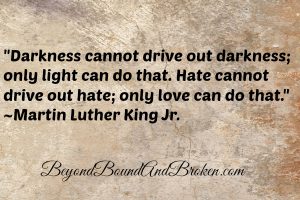Listening is the greatest communication tool to use when you want to connect with someone.
However, it’s also the most difficult one to use because truly listening to someone requires complete attention. There are different levels of listening, and we have all been guilty of listening on a very shallow level at times. For example, when your three year old daughter is chatting on and on endlessly about her favorite Disney movie, you may tune out as your mind starts to plan what’s for dinner. Or, your next-door neighbor fills your ears for 30 minutes talking about his new lawn care program, and you start to think about your big project coming due at work.
Frequently, when we are in a conversation, we listen only halfway and spend our energy thinking about what our response will be as soon as there is a chance to jump in and talk. We appear to be politely listening, but in reality, our mind is occupied with something else.
When we listen deeply to the other person, we are listening to the words they say, and the words they don’t say. We are listening to the feelings they are expressing.
We may even reflect the feeling or paraphrase the content to demonstrate understanding. Listening requires our full and complete attention, focused eye contact and/or body language. Once you are sure the other person feels heard and understood and you are sure you understand, then it’s okay to respond.
“Any problem, big or small, within a family, always seems to start with bad communication. Someone isn’t listening.” ~Emma Thompson
Anytime I am fully listening to someone, I don’t need to think about how to communicate because they have my attention. It simply happens. I put down the phone or turn away from the computer. I turn my body toward the person who is talking with me and look directly at them to demonstrate they have my full attention.
I can always tell when someone doesn’t really get listened to very often. They aren’t sure how to respond when I focus on them and fully listen. When we make the effort to really listen deeply to someone, we are giving them the emotional space to express themselves to us.
Every one of us enjoys the attention from the people we love and those who love us. We crave it. Think of the four year old little boy who wants mom or dad to watch every thing he does. “Look Dad, watch me!” he cries out each time he jumps off the tire swing, again and again.
Listening is a great way to demonstrate you care because it does take intentional time and effort. It’s a gift you can give to the person you are listening to. They don’t have to wonder if they are being listened to.
Terry Felber, shared a memorable example of listening in his book, Am I Making Myself Clear? He states, “The story is told of Franklin Roosevelt, who often endured long receiving lines at the White House. He complained that no one really paid any attention to what was said. One day, during a reception, he decided to try an experiment. To each person who passed down the line and shook his hand, he murmured, ‘I murdered my grandmother this morning.’ The guests responded with phrases like, ‘Marvelous! Keep up the good work. We are proud of you. God bless you, sir.’ It was not till the end of the line, while greeting the ambassador from Bolivia, that his words were actually heard. Nonplussed, the ambassador leaned over and whispered, ‘I’m sure she had it coming.’”
I have no idea of how accurate that story is, and I find it easy to believe it is slightly exaggerated. However, it makes the point – we often don’t really listen. We hear what we are expecting others to say. We put our response on autopilot and dedicate our attention to something else.
Listening is so important in communication that Dr. Stephen R. Covey included it in his book “The 7 Habits of Highly Effective People.” Habit 5 is “Seek First To Understand, Then To Be Understood.”
How many misunderstandings could we avoid if we always tried to listen and fully understand the perspective of the other person before sharing our opinions, thoughts, and feelings.
In order to listen however, we must first be silent. The problem is we seldom slow down enough to listen or to think about what we are hearing.
It’s a challenge nearly all of us face in our daily lives. The crush, the rush, the bustle, and the busy. The never-ending pressure to do more, be more, and have more. In our fast paced society, there are limitless opportunities to fill our life and our time.
Joseph Conrad said, “Action is consolatory. It is the enemy of thought and the friend of flattering illusions.” Or, to put it another way, we can’t be thinking and listening deeply if we are constantly focused on activity or speaking ourselves.
Try it sometime. Set some time aside each day and listen – really listen – to your spouse, your child, or your co-worker. You will find they will share more when you are receptive to hearing what they have to say.

